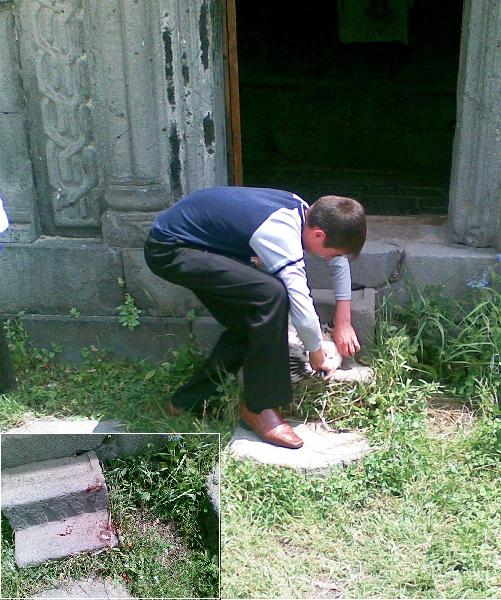Matagh on:
[Wikipedia]
[Google]
[Amazon]
 In
In
Armenian Christian
, native_name_lang = hy
, icon = Armenian Apostolic Church logo.svg
, icon_width = 100px
, icon_alt =
, image = Էջմիածնի_Մայր_Տաճար.jpg
, imagewidth = 250px
, a ...
tradition, matagh ( hy, մատաղ ''mataġ'') is a lamb or a rooster
The chicken (''Gallus gallus domesticus'') is a domesticated junglefowl species, with attributes of wild species such as the grey and the Ceylon junglefowl that are originally from Southeastern Asia. Rooster or cock is a term for an adult m ...
slated for slaughter as thanksgiving to God, a practice
Practice or practise may refer to:
Education and learning
* Practice (learning method), a method of learning by repetition
* Phantom practice, phenomenon in which a person's abilities continue to improve, even without practicing
* Practice-based ...
which has continued from Armenia's past. In many regions of Armenia
Armenia (), , group=pron officially the Republic of Armenia,, is a landlocked country in the Armenian Highlands of Western Asia.The UNbr>classification of world regions places Armenia in Western Asia; the CIA World Factbook , , and ''O ...
today, this practice is very much alive in the regular slaughter of chosen animals in front of churches.
Matagh is done often to ask God for either forgiveness
Forgiveness, in a psychological sense, is the intentional and voluntary process by which one who may initially feel victimized or wronged, goes through a change in feelings and attitude regarding a given offender, and overcomes the impact of t ...
, health
Health, according to the World Health Organization, is "a state of complete physical, mental and social well-being and not merely the absence of disease and infirmity".World Health Organization. (2006)''Constitution of the World Health Organ ...
, or to give him something in return. People generally gather at the house where the Matagh was done, where they pray and eat the meat. Tradition
A tradition is a belief or behavior (folk custom) passed down within a group or society with symbolic meaning or special significance with origins in the past. A component of cultural expressions and folklore, common examples include holidays or ...
holds that the meat must be eaten before sundown and for any salt to be used to be blessed.
While commonly misinterpreted to be a sacrifice for the remission of sins, it does not derive from the practice of atonement
Atonement (also atoning, to atone) is the concept of a person taking action to correct previous wrongdoing on their part, either through direct action to undo the consequences of that act, equivalent action to do good for others, or some other ...
through animal sacrifice
Animal sacrifice is the ritual killing and offering of one or more animals, usually as part of a religious ritual or to appease or maintain favour with a deity. Animal sacrifices were common throughout Europe and the Ancient Near East until th ...
as in the Old Testament
The Old Testament (often abbreviated OT) is the first division of the Christian biblical canon, which is based primarily upon the 24 books of the Hebrew Bible or Tanakh, a collection of ancient religious Hebrew writings by the Israelites. The ...
of the Bible
The Bible (from Koine Greek , , 'the books') is a collection of religious texts or scriptures that are held to be sacred in Christianity
Christianity is an Abrahamic monotheistic religion based on the life and teachings of Jesus ...
. As Fr. Vazken Movsesian states, Matagh is "not a magical incantation, and the Armenian Church does not condone that kind of thing. ... We don't sell protection." Most Armenians consider it a simple recognition of thanks to God and to give food and alms to the poor and needy, as a means of "paying it forward." Many describe it as simply being like any other festal meal given through the Church.
The meat is to be prepared in a simple way stove top (usually Khashlama) with minimal spices. It is not to be grilled over a fire. Also the meat is supposed to be shared among 7 families (relatives and/or neighbors). In many cases a Matagh takes place as an act of thanksgiving to God after an accident or other life-threatening event with a good outcome.
See also
* MadaghReferences
{{Cuisine of Armenia Animal sacrifice Armenian cuisine Traditional meat processing